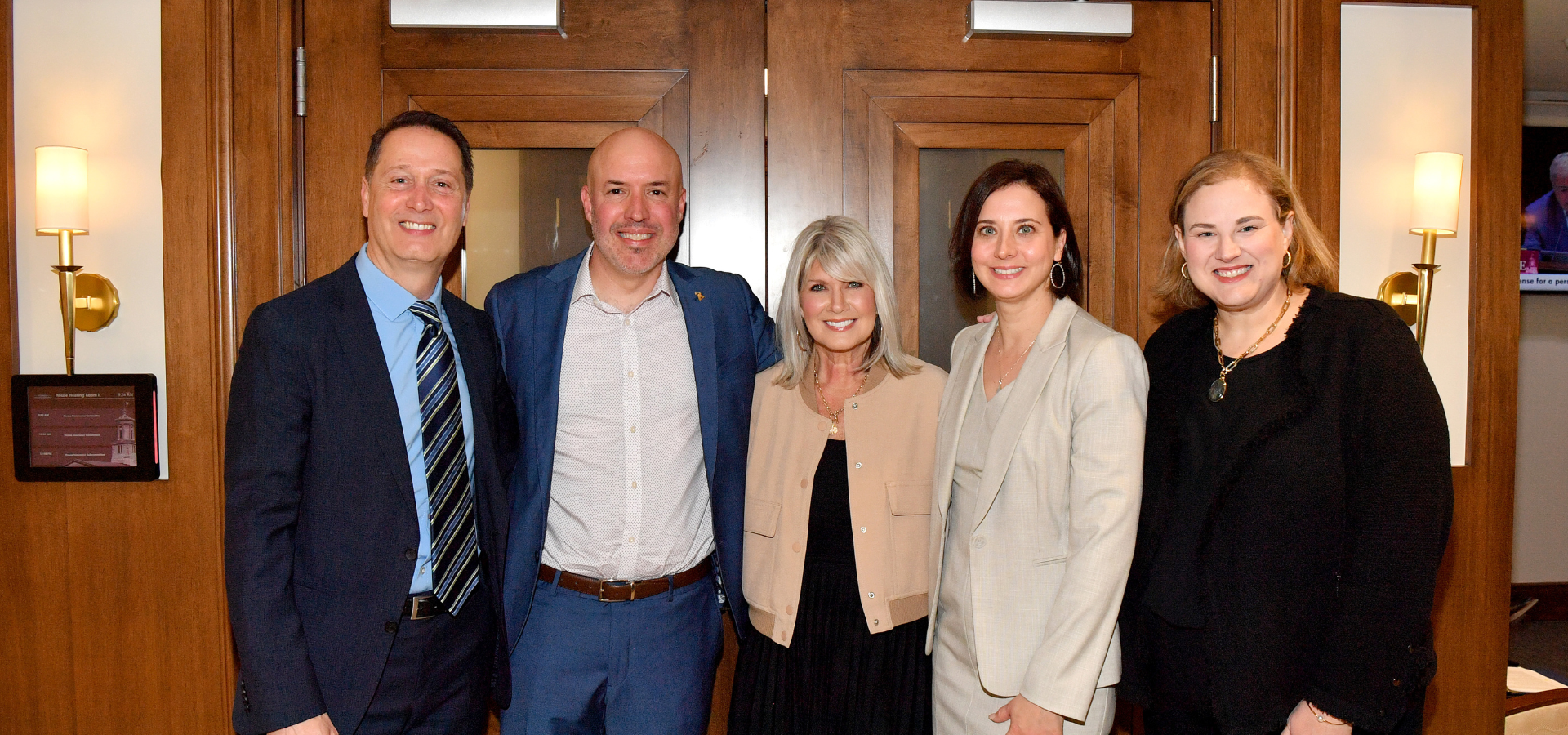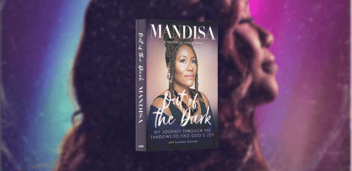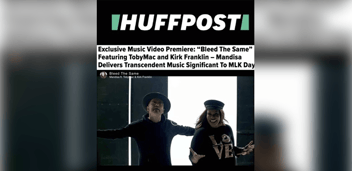
Human artistry is built into the history of Tennessee and today in the “Music City USA” Nashville capital, vital legislation to protect a person's voice, image and likeness against irresponsible and unethical uses of artificial intelligence (AI) unanimously passed the Senate and House Commerce Committees. The Ensuring Likeness Voice and Image Security (ELVIS) Act moved forward after compelling personal testimony from prominent Contemporary Christian artist-songwriters Natalie Grant and Matt Maher alongside hit songwriter/Evanescence co-founder David Hodges. The ELVIS Act is major legislation introduced by Governor Bill Lee last month along with State Senate Majority Leader Jack Johnson (R-27) and House Majority Leader William Lamberth (R-44).
(L-R) RIAA Chairman & CEO Mitch Glazier, Recording Academy Chief Advocacy & Public Policy Officer Todd Dupler, Singer-Songwriter Natalie Grant, Recording Academy Nashville Chapter Executive Director Alicia Warwick, and RIAA SVP of Artist & Industry Relations Jackie Krimmel Jones attend ELVIS Act Advocacy Day at the Cordell Hull State Office Building on February 27, 2024 in Nashville, Tennessee. (Photo by Jason Davis/Getty Images for The Recording Academy)
Watch House (HB2091) and Senate (SB2096) Committee hearings.
As AI-generated deepfakes and audio cloning become more commonplace, addressing the fundamental rights all people should have to their image, likeness and voice has never been more crucial.

Photos by Getty Images for the Recording Academy®
"Every day, there are new stories about deepfakes and AI-cloned voices and images that manipulates someone's likeness without their consent. This is not just a problem that effects celebrities, this is a human problem that affects us all. As a mother of three daughters, I am terrified by how this technology has been used to exploit teenagers,” said Grant, RIAA Gold-certified, five-time Dove Awards Female Vocalist of the Year, nine-time GRAMMY® Awards-nominated artist and Recording Academy® Nashville Chapter Governor. “It's fitting that this bill is named the ELVIS Act, because Elvis performed so many different types of songs – from love songs to the blues, from pop songs to gospel music – but he infused them with his distinct voice, likeness, and personal qualities to create something new. Every individual should have the right to control their unique God-given qualities."

Photos by Getty Images for the Recording Academy®
“As someone who writes and creates music specifically for worship in a Christian context, I believe music is part of our response to a divine Creator who made each of us unique and uniquely in His image. My voice and image set me apart, and it is part of what defines me as an individual. It also drives my career. When others use artists' voices and likeness without consent, it is a personal and fundamental violation that strikes at the heart of who we are and what we do,” said Maher, Recording Academy® Nashville Chapter Governor, a nine-time GRAMMY® Awards-nominated and RIAA Platinum certified artist. “With the ELVIS Act, Tennessee is leading the way and setting an example on this issue. It honestly pains me to think of the way that purity of artistic expression and intention could be manipulated in a way that would contradict the message of a song and of the artist who recorded it.”
“In a three-minute tapestry of words and music, my gift, and my job, is to get you to laugh or cry and to remember your most cherished times in life through my songs. The ELVIS Act is the first-of-its kind legislation that will put important guardrails around artificial intelligence for music creators. The Volunteer State is where many forms of the world's music were either born or popularized. Music is intertwined with our history, culture and economy so when technology spits out something based on ingested works created by people, something that is unauthorized, something an artist never even sang, that is wrong. Period,” said Hodges, RIAA multi-Platinum, GRAMMY® and BMI Awards-winning songwriter/producer and Nashville Songwriters Association International (NSAI) Board Member. “As a professional songwriter, syllables matter. A single note can change a song. For artists their delivery is part of their brand. They carefully choose the songs they record and release. By adding the word 'voice,' the ELVIS Act modernizes current law and makes it crystal clear that unauthorized AI-generated fake recordings are subject to legal action in Tennessee.”
“Today's action is a huge step forward toward establishing Tennessee as a leader on thoughtful guardrails for AI. As AI-generated deepfakes invade and steal what makes each of us unique, individual protections for our voices and likenesses like those in the ELVIS Act are urgently needed. The Human Artistry Campaign applauds the Tennessee House and Senate Commerce Committees for their forward-thinking legislation allowing responsible AI technology to thrive without violating our rights, threatening our safety or jeopardizing our livelihoods,” said Human Artistry Campaign senior advisor Dr. Moiya McTier.
Throughout the day, several Human Artistry Campaign members including NSAI, the Recording Academy, RIAA and SAG-AFTRA mobilized their members and orchestrated a day of advocacy at the Tennessee State Capitol, where music creators engaged in discussions with legislators, urging them to support the passage of the ELVIS Act. Tennessee artists and songwriters, most based in Nashville and Memphis, were among the participants.
Tennessee will be the first in the nation to address these fundamental human protections with new legislation. High-profile support for the ELVIS Act began with a packed press conference at the iconic Studio A, where Country guitar-slinger Lindsay Ell and legendary Christian artist Michael W. Smith spoke on behalf of other artists, songwriters, producers, engineers and musicians to the impact of AI on their community. Other attendees backing the update to Tennessee's Right of Publicity law included Ruby Amanfu, Steve Cropper, Tom Douglas, Matt Maher, Ari Morris, Lawrence “Boo” Mitchell (Royal Studios), Maggie Rose, Joanne Shaw Taylor, Gebre Waddell and Matthew West, among others. Earlier this month, singer/actor/author Chrissy Metz, hit songwriter & NSAI board member Jamie Moore and RIAA SVP of Public Policy Jessie Richard delivered compelling remarks to the TN House Banking & Consumer Affairs Subcommittee, resulting in immediate progression.
This all comes as the federal bipartisan No AI FRAUD federal gains traction and following congressional testimony from GRAMMY® Award-winning Country artist Lainey Wilson and Recording Academy CEO Harvey Mason jr. as well as nearly 300 actors, artists, musicians and songwriters co-signing these basic yet necessary protections. See here.
##




